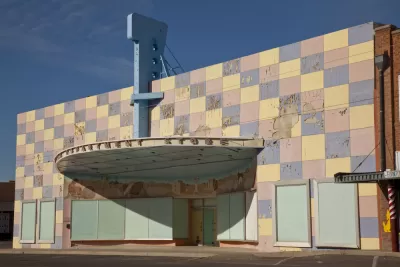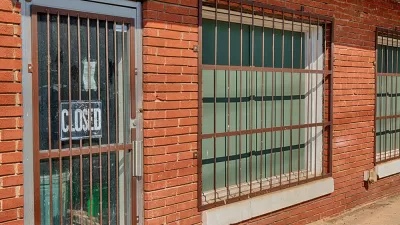Empty storefronts depress property values and suppress small business growth. What can cities do to fill these vacancies?

Writing in Next City, Ilana Preuss outlines a set of solutions for reviving urban commercial properties left vacant in recent years. “Our downtowns had suffered from commercial vacancies long before the pandemic, but COVID-19 expanded the problem dramatically,” Preuss writes. This matters because “Vacancies have a major negative impact on our downtowns and neighborhood centers, depressing surrounding property values, encouraging more neglect and suppressing the growth of small businesses.”
But how to fill these “debilitating vacancies?” Preuss has some ideas. “Fortunately, we know a lot about how to grow local businesses, especially small-scale manufacturers, and prepare them to make the transition from home-based or shared space enterprises to brick-and-mortar stores. The challenge is to match their needs with those of the owners of vacant storefronts.”
The article outlines the varied reasons why storefronts remain vacant, from renovation costs to mismatches between business needs and available properties. “Against this backdrop, innovative approaches are needed,” Preuss writes. “One option is to increase the adoption of vacant property ordinances, which typically impose added fees on properties left vacant long-term.” Cities like San Francisco and Washington, D.C. recently imposed vacancy taxes, for example.
“Another option is to use tax increment financing or other local funding vehicles to provide matching grants to property owners for storefront buildout with signed tenants, as does Longmont, Colorado’s Downtown Development Authority.” According to Preuss, “This option can be applied in markets where the cost of construction isn’t justified by current lease rates, and it can make storefront space affordable to small businesses.”
The article lists other options, such as encouraging local ownership of commercial properties and investing in land trusts, which can work well in different markets. Moving forward from the pandemic, Preuss asserts, requires taking steps to revitalize downtowns and move forward as the pandemic eases.
FULL STORY: As We Move Through the Pandemic, Here’s How to Fill Vacant Storefronts

Study: Maui’s Plan to Convert Vacation Rentals to Long-Term Housing Could Cause Nearly $1 Billion Economic Loss
The plan would reduce visitor accommodation by 25,% resulting in 1,900 jobs lost.

North Texas Transit Leaders Tout Benefits of TOD for Growing Region
At a summit focused on transit-oriented development, policymakers discussed how North Texas’ expanded light rail system can serve as a tool for economic growth.

Why Should We Subsidize Public Transportation?
Many public transit agencies face financial stress due to rising costs, declining fare revenue, and declining subsidies. Transit advocates must provide a strong business case for increasing public transit funding.

How Community Science Connects People, Parks, and Biodiversity
Community science engages people of all backgrounds in documenting local biodiversity, strengthening connections to nature, and contributing to global efforts like the City Nature Challenge to build a more inclusive and resilient future.

Alabama: Trump Terminates Settlements for Black Communities Harmed By Raw Sewage
Trump deemed the landmark civil rights agreement “illegal DEI and environmental justice policy.”

Dear Tesla Driver: “It’s not You, It’s Him.”
Amidst a booming bumper sticker industry, one writer offers solace to those asking, “Does this car make me look fascist?”
Urban Design for Planners 1: Software Tools
This six-course series explores essential urban design concepts using open source software and equips planners with the tools they need to participate fully in the urban design process.
Planning for Universal Design
Learn the tools for implementing Universal Design in planning regulations.
City of Santa Clarita
Ascent Environmental
Institute for Housing and Urban Development Studies (IHS)
City of Grandview
Harvard GSD Executive Education
Toledo-Lucas County Plan Commissions
Salt Lake City
NYU Wagner Graduate School of Public Service





























